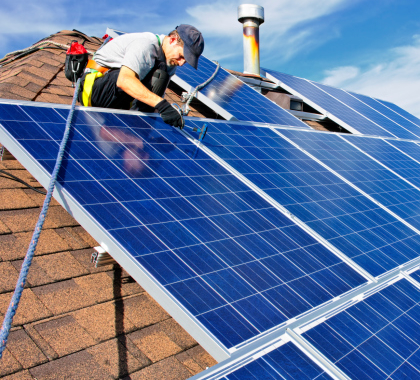In a unanimous decision on August 4, the Nevada Supreme Court disallowed a referendum for the November 8 general election ballot intended to restore net meteringrates more favorable to the rooftop solar industry and its customers. The rates were changed by a 2015 law lowering the amount roof-top solar customers were paid by utilities for any excess electricity they generated, and allowing utilities to charge customers with roof top solar systems more to service the variable power they supply than previously.
Solar Sales Fall
The previous promise of being paid full retail prices for the excess electricity generated by roof top solar systems were seen as a critical selling point for the solar industry to entice customers to install the expensive systems. Sales of roof top solar systems fell precipitously in Nevada after the law was changed to offer less generous rates.
For example, VegasInc.com reports, before the law came into effect in December, 2015, 1,311 residents in Southern Nevada submitted applications with NV Energy to start the process of installing solar panels on their homes, a number that fell to just 90 applications in January — a decrease of 93 percent.
Lyndon Rive, CEO of SolarCity, the national solar company chaired by Tesla Motors founder Elon Musk, attributed the drop-off directly to the new rate structure.
“It’s becoming increasingly clear that the (commission’s) rate hikes ended the rooftop solar industry in Nevada and took away citizens’ right to produce their own power at home,” Rive said in a statement.
Referendum Language ‘Misleading’
In striking down the referendum, the court, which heard arguments on Question 5 July 29, said the “description of effect” required to explain the effect of the measure to those signing the petition was “not only inaccurate and misleading, but also argumentative,” reports the Las Vegas Review Journal.
The court did not address the question of whether the proposal actually qualified as a referendum, saying it considers such constitutional questions only when necessary, which it was not in this instance since the language ruled the referendum out.
The decision means voters will not get to decide whether to overturn the 2015 law that allowed the Nevada Public Utilities Commission to impose higher charges for rooftop solar customers.
Though the referendum as written is dead for now, the PUC is currently considering a proposal by NV Energy to grandfather in rooftop solar customers who had systems or valid applications as of Dec. 31, 2015, allowing them to receive the more higher net metering rates that existed prior to January 1, 2016.
H. Sterling Burnett, Ph.D., ([email protected]) is the managing editor of Environment & Climate News.





